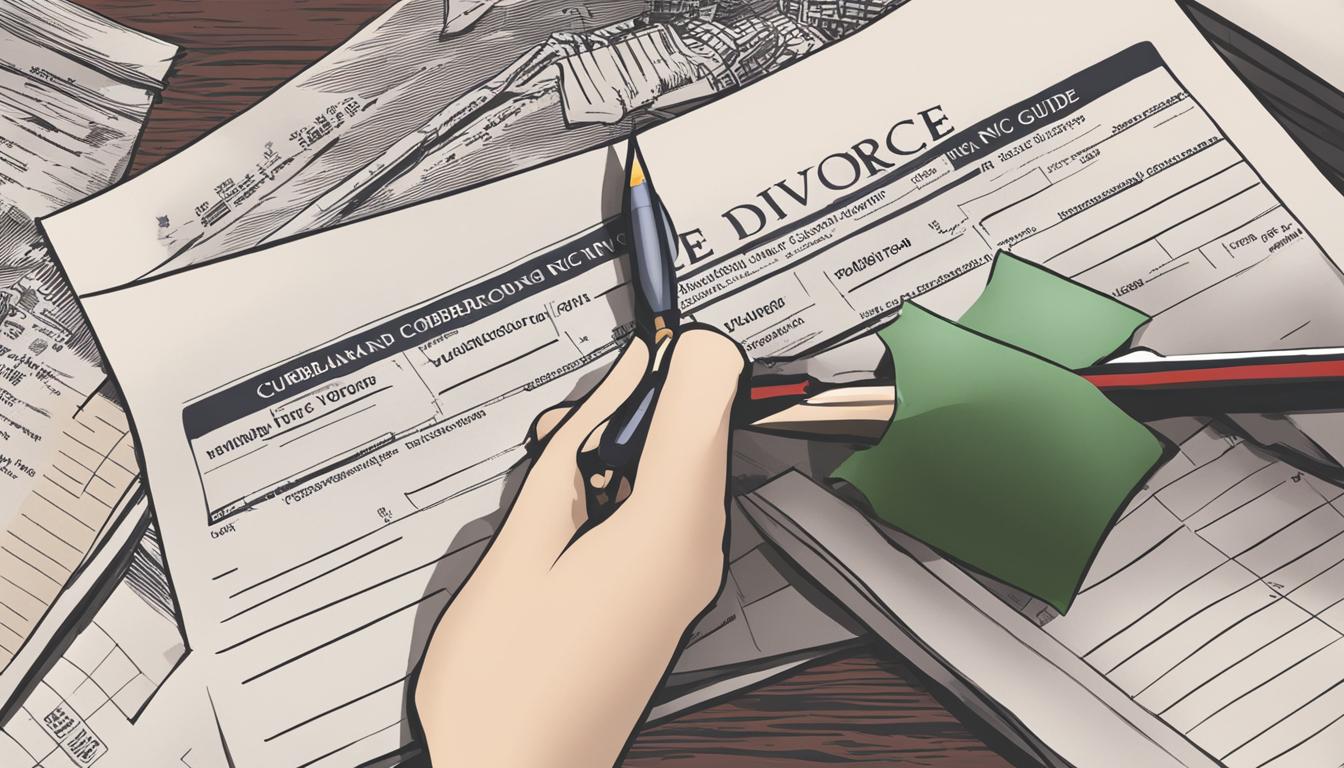Physical Address
304 North Cardinal St.
Dorchester Center, MA 02124
Physical Address
304 North Cardinal St.
Dorchester Center, MA 02124

Filing for divorce in Cumberland County, NC, can seem like traversing a challenging terrain. It’s not just about legal steps; it’s about moving through a pivotal life change.
Imagine standing at the brink of a new chapter, where every decision impacts your journey forward. In Cumberland, the divorce process comes with its unique set of guidelines and nuances.

Understanding the county’s specific divorce laws is helpful. This involves knowing the residency requirements and navigating the local court system’s procedures.
We’re here to guide you through this landscape, offering clear, actionable insights tailored to Cumberland’s divorce process. Think of this as your compass, aimed at simplifying a complex journey.
Are you ready to learn more about the steps to a smoother divorce process? Continue reading as we delve into the key strategies that make the process less intimidating and more manageable.
To get more info on filing for divorce in North Carolina, find a detailed overview in our article, How to File for Divorce in North Carolina.
To file for divorce in Cumberland County, NC, you need to meet certain eligibility criteria. Here are the two key ones to keep in mind.
Before filing for divorce, either you or your spouse must establish residency in the county.
In NC, this usually means one of the spouses must have lived in the state for at least 6 months. However, things may vary so it’s a good idea to consult the latest local laws or seek legal advice to determine the exact residency period required.
In addition to residency, a separation period is mandatory for divorce. This period refers to the time during which you and your spouse have lived separate and apart.
In North Carolina, the courts generally require spouses to be legally separated for at least one year.
The purpose of the separation period is to demonstrate the irretrievable breakdown of the marriage and the intention to dissolve the marital relationship.
Divorce can be obtained through either a no-fault basis or fault-based grounds.
You’ll want to understand these grounds as they can have a big impact when you file for divorce. Here’s an overview:
With a no-fault divorce, neither party needs to prove fault or misconduct for the marriage to end. In Cumberland County NC, you can pursue a no-fault divorce based on the grounds of a separation period.
This means that you and your spouse have lived separate and apart for a specific period of time, typically one year.
On the other hand, a fault-based divorce requires one party to prove that the other party’s actions contributed to the breakdown of the marriage.
Fault-based grounds for divorce include adultery, cruel treatment, incurable insanity, and imprisonment for more than one year.

Having a clear understanding of the grounds for divorce can help you make informed decisions about the best approach for ending your marriage.
| No-Fault Divorce | Fault-Based Divorce |
|---|---|
| Does not require proving fault or misconduct | Requires proving the other party’s actions contributed to the breakdown of the marriage |
| Based on a separation period | Grounds include adultery, cruel treatment, incurable insanity, and imprisonment |
| Typically a one-year separation period | Requires gathering evidence to support the allegations |
Filing for divorce in Cumberland County, NC involves several steps that must be completed accurately and timely. This section will provide a step-by-step guide on how to file for divorce.
Divorce can be a challenging and emotional process. It’s a good idea to seek legal advice from a qualified divorce attorney to ensure your rights are protected throughout the filing process in Cumberland County, NC.
Filing for divorce in Cumberland County, NC incurs certain fees and costs. This section gives you an overview of the filing fees.
When filing for divorce, you can expect to pay the following:
| Fee | Cost |
|---|---|
| Divorce Filing Fee | $225 |
These fees are subject to change so it’s a good idea to verify the current fees with the courthouse or consult with an attorney.
Accepted methods of payment typically include cash, money orders, or certified checks. Credit card payments may be accepted in some cases. Again, it’s best to confirm with the courthouse beforehand.

If you are facing financial hardship and cannot afford the filing fees, there may be fee waiver options available. A fee waiver allows individuals to have their filing fees waived, alleviating the financial burden associated with the divorce process.
To qualify for a fee waiver, there are specific criteria that must be met.
Eligibility for a fee waiver is based on financial hardship. Individuals who are experiencing significant financial difficulties may be eligible to have their filing fees waived.
To qualify for a fee waiver, you’ll need to provide documentation of your financial hardship, such as proof of income and expenses. This documentation helps the court assess your financial situation and determine if a fee waiver is appropriate.
Judge E. Maurice Braswell Cumberland County Courthouse: 117 Dick St. Fayetteville, NC 28301
When you get to the Cumberland County Courthouse for your divorce hearing, you’ll need to get a good understanding of how things work there.
Divorce hearings here follow certain steps to make sure everything is fair and runs smoothly. These include handing in your papers, setting up times for your hearings, and knowing how to act in the courtroom.
Getting ready for a divorce court hearing takes some planning. Make sure you double-check the date, time, and which courtroom your hearing is in. It’s a good idea to get to the courthouse early. This gives you time to go through security and find where you need to be. Also, don’t forget to bring all the papers and evidence you need for your divorce.
During the hearing, it’s really important to follow the rules of the courtroom. Dress right and be respectful to the judge, the court staff, and everyone else there. Stay calm, don’t cause any trouble, and keep your cool the whole time.
Hiring a lawyer is usually a good idea when you’re going through a divorce, but sometimes you might decide to handle it on your own. Before you do, it’s smart to know what you’re up against.
If you go the DIY route for your divorce, there are some helpful resources out there. Cumberland County has self-help centers where you can get the forms you need and learn how to fill them out right. Plus, you can find a lot of useful information and support from online sources and legal aid groups.
But remember, handling your own divorce means you need to really understand the law and how the court works. It’s super important to learn about the divorce laws and get to know the court’s rules. Being ready and organized can really boost your chances of getting through your divorce smoothly on your own.
When you do a DIY divorce, you’re in charge of everything. This includes getting all your paperwork together, making big decisions about things like kids and property, and standing up for yourself in court.
If things get too tough or you’re not sure what to do next, it might be a good idea to talk to a lawyer. They can help guide you and make sure you’re making the right choices.
To see how this process of filing for divorce in Cumberland compares to that in other NC counties, check out our articles about how to file for divorce in Catawba and filing for divorce in Durham.